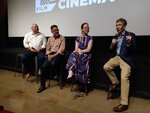By Jan Willms
It has been 10 years since the Marriage Equality Law passed in Minnesota – a history-making and life-changing event for many people.
In celebration of Pride month, MSP Film Society recently screened “How Love Won,” a documentary film by Michael McIntee. It explores the nuts and bolts of a campaign to provide the same legal rights of marriage to the LGBTQ community that heterosexuals enjoy. The screening was held at the Main Cinema, 115 SE Main.
The film was released in 2016 and takes a close look at how an attempt to pass a bill that had failed in 30 other states was successful in Minnesota. Republican legislator Michele Bachmann was hoping to get an amendment passed that would ban same-sex marriage, and she supported putting it on the ballot for the people to vote on. That amendment failed, and LGBTQ activists moved forward to pass a bill that would build on this momentum and make marriage legal for everyone.
Following the screening which took viewers back to the discussions, tactics and strong emotions that flourished at the time, director McIntyre facilitated a panel discussion on what had happened then and what is happening now.
Former Minnesota United For All Families Campaign Director Richard Carlbom, co-author of the bill, State Senator Scott Dibble and UpFront Executive Director Kat Rohn, all of whom had been a part of that campaign and resulting success from 10 years ago, participated in the panel.
McIntee’s documentary could be called a blueprint for how to have conversations about difficult issues and address the hate that may be present. Those small conversations, in schools and church basements across the state in rural and urban settings made the difference, pointed out panelists after the film showing. “Conversations will change hearts and minds,” said Carlbom.
The filmmaker focuses on people who would directly be affected by the legislation they were hoping to pass. Activists studied carefully what had worked and had not worked in previous states that were trying to pass the marriage equality bill and had failed. They embraced the tough conversations. And love won.
HOW THE NARRATIVE WAS CHANGED
Reflecting on the film, Carlbom said he remembered fundraisers, fundraisers, fundraisers.
Dibble said seeing the film again reminded him, especially with some of the current issues regarding LGBTQ across the nation, that Minnesota was able to stand up and achieve passage of the marriage equality law. “The whole state was able to fight, and the film reminds me that we can do so again,” he said.
“I think the power of story, of people showing up for one another, the story of Minnesotans all over the state having these conversations is what the film brings out,” said Rohn. “I think about my parents and grandparents sitting in church basements and having these conversations about us. That’s what changed this narrative.”
When McIntee asked about the current situation across the country regarding the LGBTQ community, Carlbom noted that in 2021, there were zero laws against trans individuals on the books. Today there are 23 anti-trans laws that have been passed.
According to Dibble, what is happening today is shocking and deeply disturbing. He cited the circumstances of women in the 50s trying to enter the professional work force, the Japanese internment, and the civil rights struggles. Although progress can always draw pushback, Dibble said progress always prevails. “With integrity, courage and dignity we will stand up and tell our stories,” he stated.
Carlbom said that with recent pro-LGBTQ legislation passed in the state, Minnesota has become a shining beacon for the 21 states that have had anti-trans laws passed.
“We are going to dig in deep here and do everything we can to show up,” Carlbom said. “People have been empowered to say things out loud that they have been thinking for a long time, and they are getting on school boards and city councils. We have to show up at Pride, we have to be visible, and we have to continue these conversations we have started to make people realize how proud of ourselves we are. We have to fight this fight day in and day out, every year.”
Rohn said she applied for her job with UpFront because “we need this moment. National polls are at 71 percent in favor of gay marriage across the country. I firmly believe we will have these same conversations about trans,“ Rohn said.
Rohn added, “We have to push as hard as we can, giving people hope. I hear from other states that our stories and messages will resonate. When people lose that sense of hope and go back to living silently is when we have to keep that hope up.”
Carlbom observed that he believes when you invite people into conversation and share part of your perspective, it is the most effective way of getting someone to change their mind. “Forces coming after our trans brothers and sisters are scary, and we need to organize around those conversations.”
He recalled waking up this last November and seeing how Minnesota voted “made me so proud. It actually made for a safer Minnesota. It makes these conversations we have to have a little easier.”
Dibble talked about the importance of bread and butter issues for everyone, and he also said the things learned from the LGBTQ community are so profound. ”We have to win the next election, he stated. “The Minnesota United For All Families campaign is so important.”
Rohn said she thinks real strength is so much built on decades of grassroots organizing. Referring to the work done on behalf of the marriage equality law, she said people did not just show up. “This is a model for moving forward. You can start building a sustaining movement across the country. That is the goal.”
‘YES, WE ARE BETTER OFF’
When McIntee asked the panel if things were better now than 10 years ago, the panel agreed that they were.
“We have 14 queer legislators in Minnesota,” Dibble said. We have three women of color, and two of them are queer.”
Carlbom reflected on the great people he is meeting these days. He admitted that hatred and uncertainty are still out there and very real for many, but the organizing has continued. “Queer people and trans people have been elected and lead the country,” he said. “We have a lot to be proud of 10 years later in Minnesota. There have been so many great victories. We are definitely better off 10 years later.”
“I worry a little about going to bathrooms,” Dibble said. “That can be real scary in this moment, but it is exactly the same stuff I heard. Growing up in middle school. Ten years later on there are more of us. We are in a better place, and we need to keep persevering.”
More people are coming out and having a marriage experience, according to Rohn. “Young people get to see it, and I am proud of what we have done. Yes, we are better off.”


Comments
No comments on this item Please log in to comment by clicking here